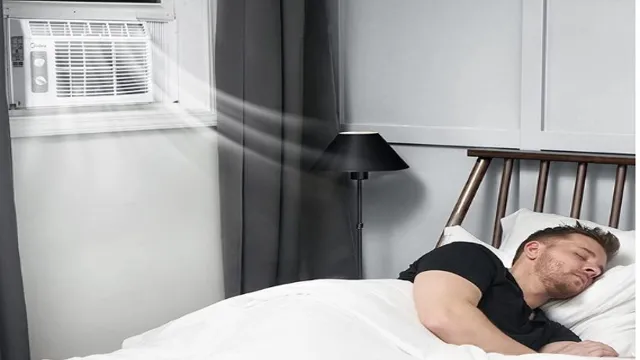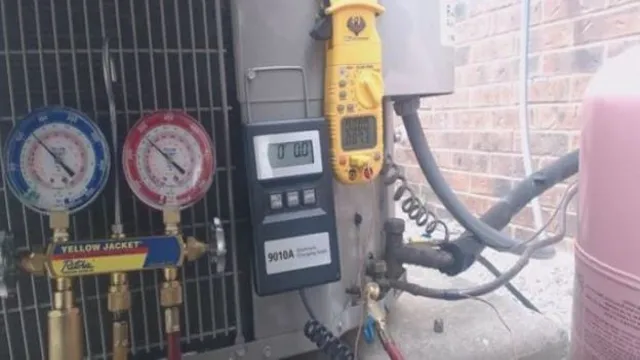When summer’s scorching heat hits, we rely on our air conditioning to keep us cool and comfortable. But what do you do when your AC won’t go below 75 degrees? It’s frustrating, right? You expect your AC to blast icy cold air, but instead, it feels like the outdoor temperature. It’s easy to feel defeated and wonder what went wrong.
But fear not, we’re here to help you troubleshoot and fix the issue. In this blog, we’ll highlight the most common reasons why your AC won’t go below 75 degrees, and how you can rectify the problem to enjoy a comfortable living again. So, buckle up, and let’s dive in!
AC Temperature Limits
One reason your AC won’t go below 75 degrees could be due to its temperature limits. Most residential AC units won’t allow you to decrease the temperature below 68-72 degrees Fahrenheit. This is because the system is designed to cool the air down to a specific, energy-efficient level and prevent the unit from overworking itself.
Sometimes, the temperature limits may be set by the thermostat, cycles, or electrical issues. However, if your AC won’t go below 75 degrees and continues to struggle despite you setting the temperature lower, it may be a sign that your unit needs repair. Scheduling regular maintenance appointments and checking your AC’s air filter can help prevent any potential issues and ensure your unit is working optimally.
Remember, regular maintenance can extend the life of your air conditioning system.
Explanation on the Science of AC
When it comes to AC temperature limits, there are a few things to keep in mind. The first thing to understand is that every AC unit has a temperature range in which it can effectively cool a room. Going below or beyond this range can result in inefficiency or even damage to the unit.
Generally, the ideal temperature range for an AC unit is between 68°F and 72°F. However, it’s essential to note that this range can vary depending on factors such as the size of your room, the number of people in it, and whether there are any heat-generating devices in the space. It’s always best to consult with an HVAC technician to determine the optimal temperature range for your specific needs.
Remember that keeping your AC unit within the appropriate temperature limit not only increases its efficiency but also prolongs its lifespan.

Factors Affecting AC Performance
AC temperature limits are a crucial factor in AC performance, as exceeding the recommended limits can significantly impact the unit’s functionality and even cause permanent damage. Every AC unit comes with a manufacturer-specified temperature range within which it should operate. This range is typically between 60 and 85 degrees Fahrenheit, with some models having a wider range.
When the temperature drops below the lower limit, the unit may struggle to operate correctly, and when the temperature rises above the upper limit, the unit can overwork itself, leading to possible breakdowns or malfunctions. Therefore, it is essential to ensure that your AC is always operating within its recommended temperature limits by taking steps such as regular maintenance, timely repairs, and installing a programmable thermostat, which can help you monitor and control the temperature more effectively.
Improving AC Performance
Many homeowners complain that their AC won’t go below 75, leaving them sweltering in the summer heat. Luckily, there are several ways to improve the performance of your AC and keep your home cool and comfortable. Firstly, make sure your thermostat is functioning properly and set to the correct temperature.
If this isn’t the issue, check that your air filters are clean and replace them if necessary. Dirty filters can cause a decrease in airflow and make your AC work harder, resulting in higher temperatures. It’s also important to have your AC serviced regularly by a professional to ensure it’s running efficiently.
Additionally, consider installing window shades or using blackout curtains to reduce the amount of direct sunlight entering your home. By taking these steps, you can improve the performance of your AC and enjoy a cool and refreshing home all summer long.
Maintenance Tips for Your AC
As summer approaches, it’s essential to make sure that your AC unit is in tip-top shape. The last thing you want to experience on a hot and humid day is a malfunctioning AC system. Taking preventive measures can save you a considerable amount of time and money down the road.
Changing the air filter every three months can improve your AC system’s performance significantly. A dirty or clogged filter can restrict the airflow, causing your unit to work harder, and increasing your energy bills. Another tip is to clean your evaporator and condenser coils.
The buildup of dirt and debris on the coils can hinder the heat exchange process, reducing the system’s efficiency. In addition, you may want to consider investing in a programmable thermostat that allows you to set the temperature based on your schedule. By doing so, you can save energy and money while maintaining a comfortable home environment.
These simple maintenance tips can help prolong the lifespan of your AC system and enhance its performance throughout the summer months.
How to Keep Your AC Clean and Healthy
Improving AC Performance Air conditioning units are a vital part of our lives, especially during the hot summer months. They provide us with comfort and convenience when we need it the most. However, when not properly taken care of, AC units may perform poorly and lead to higher energy bills.
The good news is that there are simple steps you can take to improve the performance of your AC unit. One of the quickest ways to do this is by keeping the unit clean. Dirt and debris can build up in the filter, coil, and fan blades, reducing the unit’s airflow and efficiency.
Regular cleaning and maintenance of these components ensure that your AC unit runs smoothly. You can also consider upgrading your unit’s insulation and sealing any leaks to reduce energy loss and increase performance. By improving AC performance, you not only save money on energy bills, but you also increase your unit’s lifespan and keep the air in your home fresh and healthy.
Upgrades and Add-ons for your AC
Improving AC Performance with Upgrades and Add-ons As the summer temperatures rise, your AC unit may struggle to keep up with the demand. Upgrades and add-ons can help improve the performance of your air conditioning system, ensuring that you stay comfortable all summer long. One upgrade you might consider is adding a programmable thermostat.
This will allow you to set your AC to turn on and off at specific times, saving energy while still keeping your home cool. Another option is to install a dehumidifier, which will remove excess moisture from the air, making it feel cooler and improving the overall comfort level in your home. Additionally, consider upgrading your air filters to high-efficiency versions, which can trap more dust, allergens, and pollutants, leading to better air quality and less strain on your AC system.
By making these simple upgrades and add-ons, you can boost the performance of your AC and ensure that you stay cool and comfortable all summer long.
When to Call in a Professional
If you find that your AC won’t go below 75, it may be time to call in a professional. While there are some small issues that can be easily fixed, such as a dirty air filter or low refrigerant levels, there could be underlying issues that require the expertise of a licensed technician. Ignoring the problem might lead to more significant malfunctions that can be costly to repair.
A professional will be able to identify the root of the problem and provide a solution to ensure that your air conditioning system is working effectively, saving you money in the long run. Don’t wait until the summer heatwave hits to get your AC unit inspected. Schedule maintenance with a professional to keep your home comfortable and cool all year round.
Signs that Indicate AC Repair is Needed
If you notice strange sounds or a change in temperature coming from your air conditioner, then it may be time to call in a professional for AC repair. It’s important to address these issues sooner rather than later to prevent further damage and higher repair costs. Other signs to look out for include foul odors, poor air circulation, and leaks.
If you experience any of these symptoms, don’t hesitate to contact an HVAC technician. They’ll be able to diagnose the problem and provide a solution to get your AC up and running efficiently again. Overall, regular maintenance and prompt repairs can help extend the lifespan of your unit and keep your home comfortable throughout the year.
So, if you suspect that your AC may require attention, be sure to schedule a professional inspection as soon as possible.
Tips for Choosing the Right HVAC Contractor
When it comes to home heating and cooling, there are times when a professional HVAC contractor is needed. For instance, if your furnace is making strange noises, or your air conditioner is blowing warm air, it’s best to call in a professional to assess the situation. As a homeowner, there are things you can do to ensure you choose the right HVAC contractor.
Start by asking for referrals from friends and family members who have had similar work done. You can also do some research on local companies to get a sense of their reputation. Look for companies that are licensed and insured, and have experience working with the type of system you have.
Don’t be afraid to ask for references and get multiple quotes to ensure you’re getting a fair price. Remember, the right HVAC contractor can make all the difference in keeping your home comfortable and energy-efficient, so take the time to choose wisely.
Conclusion
In the battle between you and your AC, it seems like the AC has come out on top. Perhaps it’s reluctant to go below 75 because it wants to teach you a lesson about energy conservation, or maybe it’s just stubborn. Either way, you can try to negotiate with your cooling system or resign yourself to a slightly warmer living space.
Who knows, maybe you’ll even discover the joys of slightly warmer indoor temperatures! At the very least, you can take comfort in the fact that you’ve tried everything to lower the temperature, from adjusting the thermostat to cleaning the air filters. In the end, remember that the most important thing is your comfort, whether it’s a cool breeze or a cozy sweater. So sit back and relax, and don’t sweat the small stuff (literally).
“
FAQs
What temperature ranges are typically achievable with an air conditioning unit?
The majority of air conditioning units can cool a room down to 68-72 degrees Fahrenheit. However, the exact temperature range can vary depending on the make and model of the unit.
Can a dirty air filter restrict the amount of cold air that an air conditioner can produce?
Yes, a dirty or clogged air filter can inhibit the amount of cold air that an air conditioner can produce. It’s recommended to change the air filter every 1-3 months to help maintain the unit’s efficiency.
Does the size of an air conditioning unit play a role in its ability to cool a room?
Yes, the size of an air conditioning unit can impact its ability to cool a room. An undersized unit may struggle to cool a larger space, while an oversized unit may not properly dehumidify a smaller space. It’s important to choose the right size unit for the room being cooled.
What could be causing an air conditioner to not reach temperatures below 75 degrees Fahrenheit?
Several factors could be contributing to an air conditioner not achieving temperatures below 75 degrees Fahrenheit, including incorrect thermostat settings, refrigerant leaks, dirty condenser coils, or a malfunctioning compressor. It’s recommended to have a professional diagnose and repair the issue.

